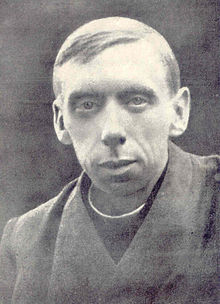George Tyrrell
| George Tyrrell | |
|---|---|
 |
|
| Born |
George Tyrrell 6 February 1861 Dublin, United Kingdom of Great Britain and Ireland (now Ireland) |
| Died | 15 July 1909 (aged 48) Storrington, United Kingdom of Great Britain and Ireland (now Ireland) |
| Occupation | Priest, theologian, scholar |
| Works | (See list below) |
George Tyrrell, S.J. (6 February 1861 – 15 July 1909), was an Irish Jesuit priest (until his expulsion from the Society) and a modernist theologian and scholar. His attempts to evolve and adapt Catholic theology in the context of modern ideas made him a key figure in the modernist controversy within the Roman Catholic Church in the late 19th century.
Tyrrell was born on 6 February 1861 in Dublin, Ireland, and was brought up as an Anglican. His father was a journalist who died shortly before Tyrrell was born. Tyrrell grew up poor. He converted and was received into the Catholic Church in 1879. He immediately applied to join the Society of Jesus, but was advised by the provincial superior to wait a year. He spent the interim teaching at Jesuit schools in Cyprus and Malta. Joining the Jesuits in 1880, Tyrrell was ordained to the priesthood in 1891. After a brief period of pastoral work, he taught philosophy at Stonyhurst, where he came into conflict with some of the faculty for not adhering to the traditional Jesuit approach to Thomas Aquinas, which was heavily influenced by the work of Francisco Suárez.
In 1896 he was transferred to the Jesuit House on Farm Street in London. It was while at Farm Street that Tyrrell discovered the work of Maurice Blondel. In 1899 he published A Perverted Devotion in which he argued that the rationalist approach of the Scholastics was not applicable to matters of faith. Tyrrell found himself assigned to a small mission in Yorkshire.
...
Wikipedia
